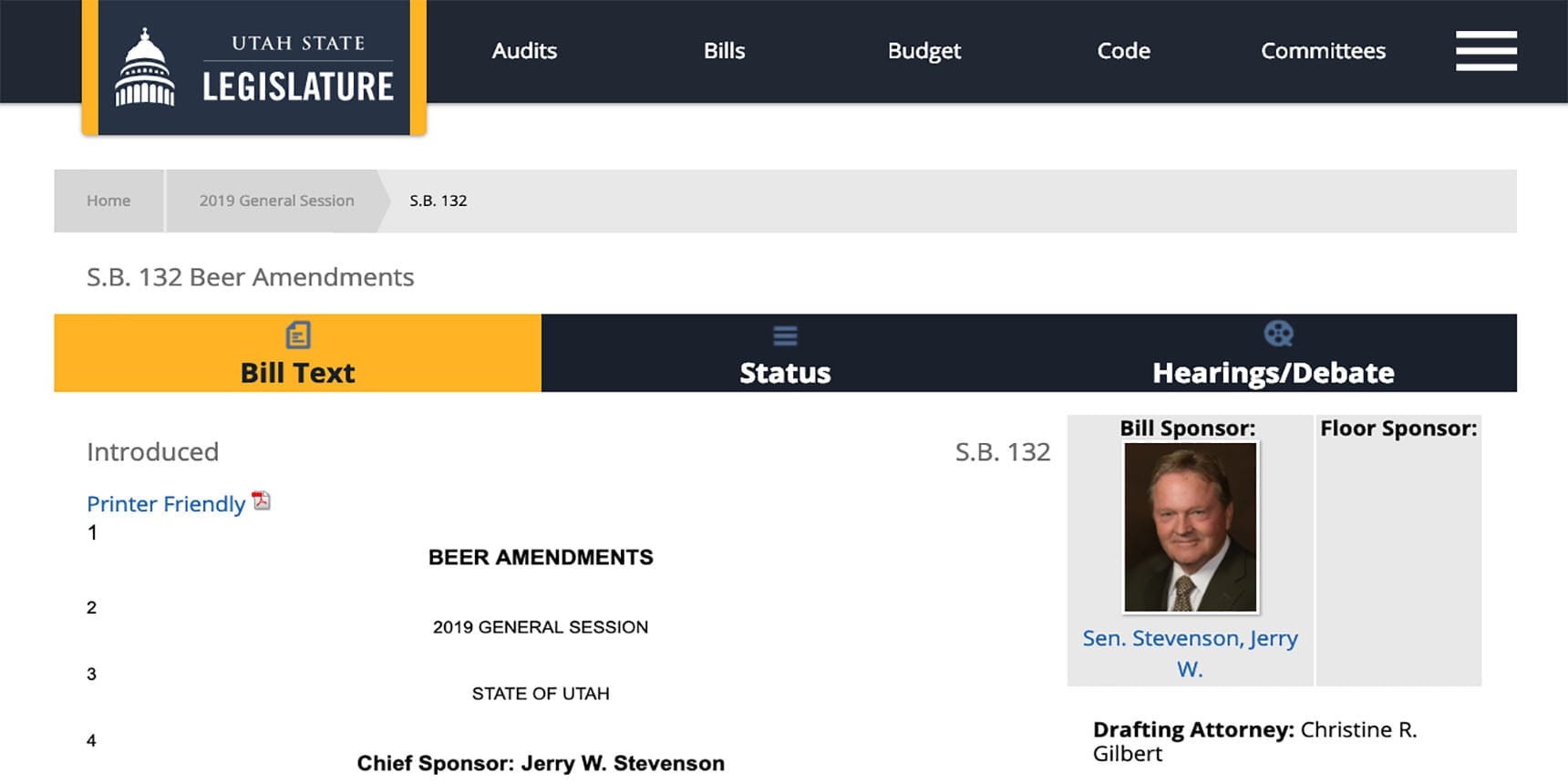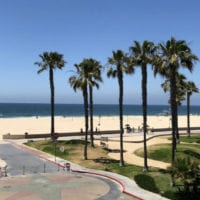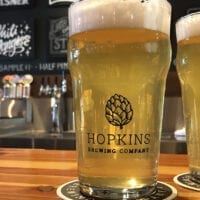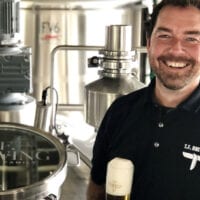
Updated Feb. 8 with additional comments after SB132 passed a Senate committee hearing.
It could be last call for Utah’s longstanding 3.2% beer law if a bill brought before the state legislature passes.
The measure (SB132), sponsored by Jerry Stevenson, R-Layton, would allow for Utah’s grocery and convenience stores to sell beer containing up to 4.8% alcohol by weight (ABW). That’s 6% alcohol by volume (ABV), a more common measure in the beer world.
Under current law, only 3.2% beer (4% ABV) is allowed to be sold in retail locations. State-run liquor stores sell higher-alcohol — so-called “heavy beer” — products.
The alcohol cap would also increase for draft beer sold in restaurants and bars, and presumably at brewery taprooms with sufficient licensing, according to the proposed legislation.
It passed a Senate committee hearing on Thursday and now goes to the full Senate for consideration. Ben Winslow, of FOX 13, reported some public comments from the Senate discussion.
BREAKING NEWS: 3.2 beer bill PASSES unanimously. @fox13 #utpol #utleg
— Ben Winslow (@BenWinslow) February 7, 2019
3.2% vs. 4.8% vs. No Cap
In previous conversations, certain local breweries have told Utah Beer News that they prefer removing alcohol-content limits altogether. That’s not surprising.
If that weren’t an option, however, many would prefer to keep the status quo rather than bump the limit to 4.8% (6% ABV), as proposed.
According to The Salt Lake Tribune, 18 states currently cap alcohol content on grocery and convenience store beer. The average limit is 10% (12.4% ABV).
The Utah Brewers Guild, which represents the state’s 30+ craft breweries, is on record saying it opposes the minimal increase. It told The Salt Lake Tribune in January that a small bump would give national brewers an advantage over local brewers.
Following Thursday’s Senate committee hearing, the Guild reiterated its stance.
“The majority of our members are opposed to an arbitrary and incremental increase to 4.8% ABW as outlined in this bill,” writes Nicole Dicou, executive director of the Utah Brewers Guild, in a statement. “They remain in favor of lifting the limit put on alcohol content of beer. However, this legislation would benefit out-of-state breweries at the expense of small, locally owned breweries who employ thousands of Utahns.”
According to FOX 13, at least one local brewery — A. Fisher Brewing Co. — spoke publicly on Thursday, saying the bill could help its growth. Fisher currently sells its beer — all 4% ABV, save for the occasional high-point release — only at its taproom.
Anheuser-Busch InBev, especially, in recent years has gobbled up several craft breweries. As such, many beer drinkers might not be aware that the world’s largest brewer now brews several once-independent brands (Goose Island Beer Co., Elysian Brewing, Golden Road Brewing, and 10 Barrel Brewing, to name a few).
Nothing to Fear?
Some in the Utah craft beer community fear that mega-brewers whose seemingly “craft” products fall at or below 4.8% (6% ABV) could potentially usurp shelf space — and tap handles — from local breweries.
When it comes to bars and restaurants, at least, others aren’t so sure.
“I really don’t think they have anything to fear,” says Michael Eccleston, co-owner of Quarters Arcade Bar in Salt Lake City. “I buy four times as much (Squatters) Hop Rising and (Red Rock) Elephino than Lagunitas IPA. The support is already there and it’s not going to go anywhere just because I (could) get Pacifico on tap.”
He added, “If I put Pacifico on tap, it will take the place of Blue Moon or another big brewery. It’s not going to take the place of the Czech Pilsener from Bohemian.”
Eccleston believes the “all or nothing” — no limit vs. maintaining 3.2% — stance supported by the majority of Utah breweries isn’t realistic.
“I think all or nothing is really just fighting for nothing because you’re not going to get all,” he says. “I think you take what you can get and we can make things incrementally better.”
Though the proposed bump is relatively small, Eccleston sees it as an opportunity to help pivot the conversation about beer in Utah. Visitors perceive local draft beer as “weak,” he says, and are reluctant to try it.
“If it can be a 5% (ABV) beer, people will try it because they’re no longer worried about the alcohol percentage, and they’ll taste how good the beer is,” he says. “Utah beer is already really good and will stand up to its competition no matter what that is. If we can stop having the 3.2% conversation, the perception will change and it’ll open the market up, I really think it will.”
Trending Away from 3.2% Beer
In the last few months, Utah’s seen certain beers disappear from store shelves as national brewers discontinue their 3.2% beer offerings.
More states are abandoning 3.2% beer limitations. Oklahoma and Colorado recently began allowing higher-alcohol brews to be sold in grocery stores. Kansas will begin allowing the same starting April 1.
Should Utah’s SB132 fail, the state will remain one of two (Minnesota) with the 3.2% beer limit.
National brewers warned Utah retailers in late 2017 that it would curtail production of 3.2% beer, according to FOX 13. At the time, Anheuser-Busch said such low-alcohol products represented just 0.5% of all beer sold in the United States.
In December 2018, Walmart joined the push for Utah to ditch 3.2% beer. The mega-retailer said it’s to protect consumers’ right to choose. At least 13 brands have pulled six-packs from Utah stores, Responsible Beer Choice Coalition told The Salt Lake Tribune.
What do Utahns think? A Salt Lake Tribune-Hinckley Institute of Politics poll found that 49% of respondents support allowing higher alcohol beer in grocery and convenience stores.
Note:
On Feb. 25, the bill passed the Senate. On March 14, a compromise bill was sent to Gov. Gary Herbert to sign. It would increase the limits on beer sold in grocery and convenience stores to 4% ABW (5% ABV).



